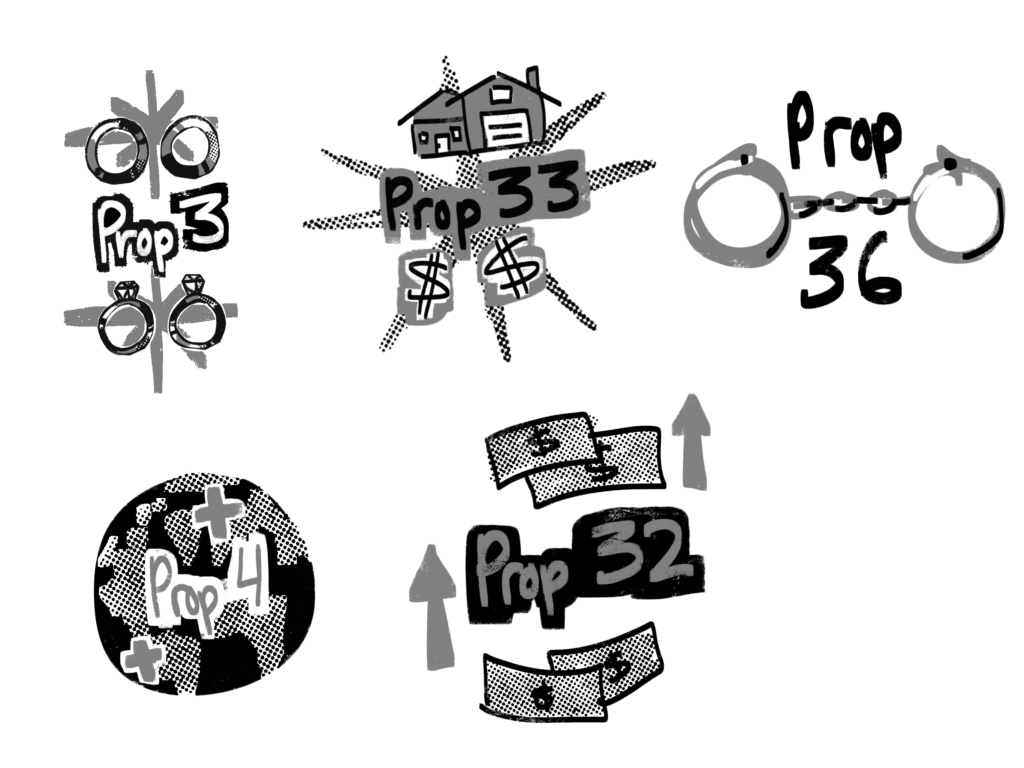
Eden Kwan
From Oct. 7 to Nov. 5, Californians voted on ten propositions. Put forward by California residents,
propositions are voted on in every California general election.
PROP 3
Proposition 3 repeals 2008’s Proposition 8, which added to the constitution that “only marriage between a man and a woman is recognized in California.” Proposition 8 banned same–sex marriage until the Supreme Court decision Obergefell v. Hodges in 2015, which invalidated the proposition.
Some believe that due to the recent overturning of Roe v. Wade, which had been widely accepted and stood for almost 50 years, Obergefell v. Hodges could also be overturned.
“If taken away, it’s another infringement of freedom of choice,” said senior Lexi Martin. “There’s a bunch
of friends I know who would definitely be affected by this in the future … It’ll limit them from seeing the people that they like and it essentially declassifies them as couples.”
Others believe the proposition could open the door to similar laws in other states.
“California is, for a lot of things, [a trendsetter],” said senior Phoebe Taylor. “If one state starts to do something, other states might follow suit. More conservative states [might] also be inclined to do the same thing, and that will make gay marriage a lot safer in those states.”
Opponents claim it would make it possible to legalize child marriage, incest and polyamory. The President of the National Center for Law and Policy Dean Broyles implied the proposition could open the door to human/AI marriage.
However, supporters say that it is unlikely.
“[Proposition 3] is in regards to marriage between same genders,” Martin said. “Regarding age or family relations [is] completely out of the question. The fact that they’re arguing about that is really confusing.”
Supporters of this proposition include Gov. Newsom.
“It’s time that our laws affirm marriage equality regardless of who you are or who you love,” Newsom said in a statement. “California stands with the LGBTQ+ community and their right to live freely.”
PROP 33
Proposition 33 revokes the 1995 Costa-Hawkins Rental Housing Act, which prohibits the local government from limiting rental rates.
Supporters believe it will make California a more affordable place to live.
“People who are not as wealthy need a place to live,” said junior Andrew Akkawi. “So the ability of the government [to] regulate rent and prices … would [make it] more fair … because [it is] extremely expensive.”
However, others are skeptical of the proposition.
“It could make things a lot worse for landlords [and] developers, who have to deal with declines of property values,” MacMillan said.
The proposition is important for students who want to live in the Bay Area in the future.
“I don’t think I [can] afford to live here when I’m older,” Taylor said. “It’s important for others to be aware of the rent situation and how lucky we are to be able to live here. One day, everyone is going to have to … pay these prices if they want to stay in the Bay Area.”
MacMillan remains hesitant about the proposition.
“[We] should give some time [for the proposition] to develop and see if it works,” MacMillan said. “And we should also be open to the idea of repealing it if it doesn’t go as planned.”
PROP 36
Proposition 36 reclassifies holding some drugs and thefts under $950, as felony charges — as opposed to being considered misdemeanors, a more minor crime.
Previously, violators participated in rehabilitation, community service programs or probation.
Some oppose the proposition, believing people charged with these crimes shouldn’t have to serve jail time.
“Drug addiction is a disease … and [people are] being criminalized for it,” said history teacher Scott Bondurant. “We already spend way too much money on prisons, and this is going to make costs go up by hundreds of millions. Laws like this always disproportionately affect black and brown people from low-income communities, [so] it’s gonna put more low-income people in jail who are not really a danger to anyone other than themselves.”
According to the National Association to End Homelessness, the proposition will increase homelessness if passed.
Results of the propositions will be available Nov. 5.



